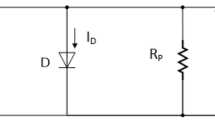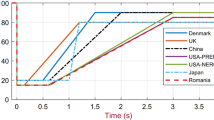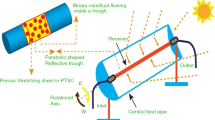Abstract
The study of renewable energy is expanding quickly, particularly in the areas of modeling and photovoltaic (PV) technology. The utilization of photovoltaic systems is prevalent in diverse renewable energy applications. The primary concern of photovoltaic systems is the optimization of output power to achieve maximum efficiency. Consequently, numerous investigations are being conducted to model photovoltaic systems with the aim of enhancing the power output. The process of maximizing power output on photovoltaic systems is commonly referred to as maximum power point tracking (MPPT). The implementation of MPPT methods is a crucial aspect of photovoltaic system engineering, aimed at enhancing the overall output power of photovoltaic panels. The adaptive neural-fuzzy inference system (ANFIS) has been identified as the most efficient approach for MPPT due to its rapid response time and reduced oscillation, despite the existence of alternative techniques. Nevertheless, the acquisition of precise training data poses a significant obstacle in the development of an effective ANFIS-MPPT. This study focuses on the utilization of the modified fluid search optimization (MFSO) algorithm to regulate the incremental conductance (INC) controller, thereby ensuring maximum power tracking. The input variables considered in this investigation are the irradiance as well as temperature, while the output parameter is the optimum voltage (Vmpp). A model for MPPT is constructed using MATLAB/Simulink in order to evaluate the performance of the proposed approach. The method being proposed has been subjected to testing across various weather conditions. The outcomes of the simulation demonstrate the proficient monitoring of the suggested approach in the presence of various environmental circumstances. The study employs a simulation-based approach to evaluate the efficacy of the MFSO-ANFIS-based MPPT algorithm in achieving global maxima under diverse climate conditions. The obtained results validate the proposed method's effectiveness. This approach exhibits a high degree of efficiency, speed, and stability. The findings indicate that the suggested approach effectively monitors the improved maximum power point with a performance rate exceeding 99.3%.











Similar content being viewed by others
Data availability
Enquiries about data availability should be directed to the authors.
References
Al-Dhaifallah M, Nassef AM, Rezk H, Nisar KS (2018) Optimal parameter design of fractional order control based INC-MPPT for PV system. Sol Energy 159:650–664
Aldosary A, Rawa M, Ali ZM, Razmjoo A, Rezvani A (2021) Energy management strategy based on short-term resource scheduling of a renewable energy-based microgrid in the presence of electric vehicles using θ-modified krill herd algorithm. Neural Comput Appl 14:1–6
Ali MN (2018) Improved design of artificial neural network for MPPT of grid-connected PV systems. In: 2018 Twentieth International Middle East Power Systems Conference (MEPCON) 2018 Dec 18 (pp. 97–102). IEEE
Arora S, Singh S (2019) Butterfly optimization algorithm: a novel approach for global optimization. Soft Comput 23(3):715–734
Bai J, Sun L, Pachauri RK, Wang G (2021) Investigation on photovoltaic array modeling and the MPPT control method under partial shading conditions. Int J Photoenergy 2021:1–6
Basha CH, Rani C (2022) A New single switch DC-DC converter for PEM fuel cell-based electric vehicle system with an improved beta-fuzzy logic MPPT controller. Soft Comput 26(13):6021–6040
Borni A, Abdelkrim T, Bouarroudj N, Bouchakour A, Zaghba L, Lakhdari A, Zarour L (2017) Optimized MPPT controllers using GA for grid connected photovoltaic systems, comparative study. Energy Procedia 119:278–296
Bouakkaz MS, Boukadoum A, Boudebbouz O, Bouraiou A, Attoui I. ANN based MPPT algorithm design using real operating climatic condition. In: 2020 2nd international conference on mathematics and information technology (ICMIT) 2020 Feb 18 (pp. 159–163). IEEE
Cao Y, Kou X, Wu Y, Jermsittiparsert K, Yildizbasi A (2020) PEM fuel cells model parameter identification based on a new improved fluid search optimization algorithm. Energy Rep 6:813–823
Chandramouli A, Sivachidambaranathan V (2019) Extract maximum power from PV system employing MPPT with FLC controller. Power 1(4):58
Dong R, Wang S (2018) New optimization algorithm inspired by fluid mechanics for combined economic and emission dispatch problem. Turk J Electr Eng Comput Sci 26(6):3305–3318
Farajdadian S, Hosseini SH (2019) Optimization of fuzzy-based MPPT controller via metaheuristic techniques for stand-alone PV systems. Int J Hydrog Energy 44(47):25457–25472
Ge X, Ahmed FW, Rezvani A, Aljojo N, Samad S, Foong LK (2020) Implementation of a novel hybrid BAT-fuzzy controller based MPPT for grid-connected PV-battery system. Control Eng Pract 98:104380
Guo K, Cui L, Mao M, Zhou L, Zhang Q (2020) An improved gray wolf optimizer MPPT algorithm for PV system with BFBIC converter under partial shading. IEEE Access 8:103476–103490
Hai T, Zhou J, Rezvani A, Le BN, Oikawa H (2023a) Optimal energy management strategy for a renewable based microgrid with electric vehicles and demand response program. Electric Power Syst Res 221:109370
Hai T, Zhou J, Dadfar S (2023b) A novel intelligent method to increase accuracy of hybrid photovoltaic-wind system-based MPPT and pitch angle controller. Soft Comput 12:1–8
Hai T, Zhou J, Muranaka T (2023c) Management of renewable-based multi-energy microgrids with energy storage and integrated electric vehicles considering uncertainties. J Energy Storage 60:106582
Hussaian Basha CH, Rani C (2020) Performance analysis of MPPT techniques for dynamic irradiation condition of solar PV. Int J Fuzzy Syst 22(8):2577–2598
Jafari-Marandi R, Smith BK (2017) Fluid genetic algorithm (FGA). J Comput Des Eng 4(2):158–167
Javed K, Ashfaq H, Singh R (2020) A new simple MPPT algorithm to track MPP under partial shading for solar photovoltaic systems. Int J Green Energy 17(1):48–61
Kiran SR, Basha CH, Singh VP, Dhanamjayulu C, Prusty BR, Khan B (2022) Reduced simulative performance analysis of variable step size ANN based MPPT techniques for partially shaded solar PV systems. IEEE Access 10:48875–48889
Priyadarshi N, Padmanaban S, Holm-Nielsen JB, Blaabjerg F, Bhaskar MS (2019) An experimental estimation of hybrid ANFIS–PSO-based MPPT for PV grid integration under fluctuating sun irradiance. IEEE Syst J 14(1):1218–1229
Qin F, Liu P, Niu H, Song H, Yousefi N (2020) Parameter estimation of PEMFC based on improved fluid search optimization algorithm. Energy Rep 6:1224–1232
Radhika A, Soundradevi G, Kumar RM (2020) An effective compensation of power quality issues using MPPT-based cuckoo search optimization approach. Soft Comput 24(22):16719–16725
Tang S, Sun Y, Chen Y, Zhao Y, Yang Y, Szeto W (2017) An enhanced MPPT method combining fractional-order and fuzzy logic control. IEEE J Photovolt 7(2):640–650
Veeramanikandan P, Selvaperumal S (2021) Investigation of different MPPT techniques based on fuzzy logic controller for multilevel DC link inverter to solve the partial shading. Soft Comput 25(4):3143–3154
Villegas-Mier CG, Rodriguez-Resendiz J, Álvarez-Alvarado JM, Rodriguez-Resendiz H, Herrera-Navarro AM, Rodríguez-Abreo O (2021) Artificial neural networks in MPPT algorithms for optimization of photovoltaic power systems: a review. Micromachines 12(10):1260
Wu D, Nariman GS, Mohammed SQ, Shao Z, Rezvani A, Mohajeryami S (2020) Modeling and simulation of novel dynamic control strategy for PV–wind hybrid power system using FGS–PID and RBFNSM methods. Soft Comput 24(11):8403–8425
Acknowledgements
This work was supported by Foundation of State Key Laboratory of Public Big Data (No.2023004), National Natural Science Foundation of China (no.6186251), the Science and Technology Foundation of Guizhou Province (No. ZK[2022]546), the Natural Science Foundation of Education of Guizhou Province (No.[2019]203, No. KY[2019]067), and the Funds of Qiannan Normal University for Nationalities (No.qnsy2019rc09).
Funding
This study was not funded any institution and organization.
Author information
Authors and Affiliations
Corresponding authors
Ethics declarations
Conflict of interest
Author declares that he has no conflict of interest.
Human participants and/or animals
This article does not contain any studies with human participants performed by any of the authors.
Informed consent
The processes of program coding, numerical execution, and statistical analysis were based on personal computers. All authors agreed to publish this paper, if accepted.
Additional information
Publisher's Note
Springer Nature remains neutral with regard to jurisdictional claims in published maps and institutional affiliations.
Rights and permissions
Springer Nature or its licensor (e.g. a society or other partner) holds exclusive rights to this article under a publishing agreement with the author(s) or other rightsholder(s); author self-archiving of the accepted manuscript version of this article is solely governed by the terms of such publishing agreement and applicable law.
About this article
Cite this article
Hai, T., Zain, J.M. & Muranaka, K. A novel global MPPT technique to enhance maximum power from PV systems under variable atmospheric conditions. Soft Comput (2023). https://doi.org/10.1007/s00500-023-09069-w
Accepted:
Published:
DOI: https://doi.org/10.1007/s00500-023-09069-w




